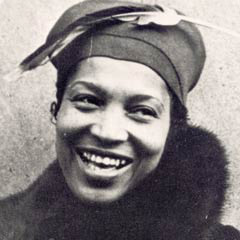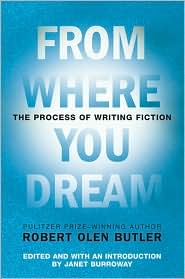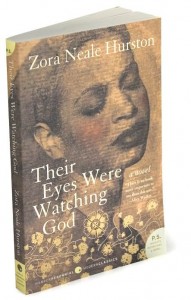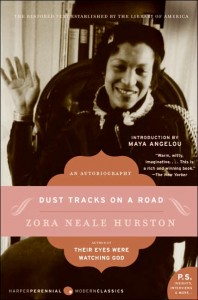 Quotes and Notes is a monthly craft essay series by Steven Wingate. Steven teaches at the University of Colorado. His short story collection Wifeshopping won the 2007 Bakeless Prize in fiction from the Bread Loaf Writers’ Conference and was published by Houghton Mifflin in 2008.
Quotes and Notes is a monthly craft essay series by Steven Wingate. Steven teaches at the University of Colorado. His short story collection Wifeshopping won the 2007 Bakeless Prize in fiction from the Bread Loaf Writers’ Conference and was published by Houghton Mifflin in 2008.
“You take up the pen when you are told, and write what is commanded.”
— Zora Neale Hurston

In my early years of wanting to become a fiction writer I ran across this quote and used it to justify writing a whole lot of first drafts that I rarely came back to. Now I suspect that Hurston, who was not a prodigious fictionist, would not have approved. Her work does not reveal her as either an “automatic” writer in the mode of Madame Yeats or a “first thought = best thought” writer who expected constant streams of unchecked, orgiastic inspiration. When I think of her words today, something else comes to mind: that we need to position ourselves to take advantage of our inspiration when it comes in all phases of our work, because it might not come at all if we aren’t prepared for it.
I would like especially to consider Hurston’s quote in the context of note-taking and revision, which we normally don’t think of as particularly inspired phases of the fiction process. Preparing the canvas can be a long and dreadful bore; we learn about our characters in slow motion, wanting to write the work itself but knowing that we aren’t yet ready. We synopsize, sometimes outline, sometimes take copious notes that we then ignore completely. Revision tends to be a mind-numbing slog that can get even more turgid and tense once agents and editors get involved. Despite their non-romantic status, these phases are exceptionally fertile ground for inspiration if we follow Huston’s words and leave ourselves continuously open to spontaneity on the page regardless of what phase we are in. “You take up the pen when you are told, and write what is commanded” applies just as much to a tenth draft—and to the laborious note-taking
phase—as it does to a heady, uninhibited first draft.
Inevitably in a fiction project we will be told to pick up the pen many times, and the commandments we receive while holding them will be disparate in their nature. Sometimes we will slash a draft to bits, other times make sketches or studies the way a painter does, other times keep events exactly as they are and change voice or psychic distance. In each instance, the razor’s edge we walk through the draft is the same: too little control leads us to muddle, too much control leads us to inflexibility. To remain in the spirit of writing what is commanded, we must enter into preparation and revision with the same spontaneity that we give to those drafts that are least encumbered by expectations.
 I believe that it’s possible to both plan and revise without losing the surprise and immediacy of the author/character relationship, but it certainly isn’t easy. Robert Olen Butler—my own most important fiction teacher—writes in From Where You Dream of the dangers inherent in revision. Regardless of how we may have followed our writerly instincts in one draft, we will be always tempted to “think through” our narrative arcs and the lives of our characters, manipulating them to better meet goals that we (or others) have set. It takes effort to keep the mind out of the equation in the revision process, because the mind naturally wants to be involved—and I don’t believe that the mind is some bugaboo inimical to fiction, or that it must be excluded. Allowing the mind to get involved in revision can do great things by revealing gaps in our own understanding of our characters, which in turn can re-inform the imagination and spark it to a greater intimacy with our material.
I believe that it’s possible to both plan and revise without losing the surprise and immediacy of the author/character relationship, but it certainly isn’t easy. Robert Olen Butler—my own most important fiction teacher—writes in From Where You Dream of the dangers inherent in revision. Regardless of how we may have followed our writerly instincts in one draft, we will be always tempted to “think through” our narrative arcs and the lives of our characters, manipulating them to better meet goals that we (or others) have set. It takes effort to keep the mind out of the equation in the revision process, because the mind naturally wants to be involved—and I don’t believe that the mind is some bugaboo inimical to fiction, or that it must be excluded. Allowing the mind to get involved in revision can do great things by revealing gaps in our own understanding of our characters, which in turn can re-inform the imagination and spark it to a greater intimacy with our material.
So unless we go in for automatic writing, our minds are inevitably going to be involved in our fiction. The issue is how we let them do their work without being unduly affected by their influence. Our minds can muck things up terribly when we let them limit spontaneity on the page, and that is the key to gauging whether we are approaching revision in a good spirit (guided by a desire to further understand our characters) or a bad one (making them do what we want in order to fit our predetermined goals). If a mind—whether it belongs to us, our agents, our editors, our most trusted readers—is capable of pushing us deeper into our imaginations, then I say bully for that mind. But, as Butler warns us, we must be careful when we invite the mind to the authorial banquet. The litmus test is whether we are capable of achieving spontaneity on the page in every phase and always learning more about the essential conundrums of our characters. If we can do that, and we continue to surprise ourselves in the sixth draft like we did in the first, then we’re in good shape. We have let the mind do its work, listened to what it has to say, and gone back to writing what is commanded in one of the many ways it is possible to do so.
The canvas-preparing phase prevents even more temptations for the mind to muck things up than revision does, especially today when so much authorial time and energy goes into thinking about plot. Our narrative environment is so influenced by cinema—particularly by the rigid structure of the commercial Hollywood film—that some fiction writers obsess about plot to the exclusion of other tools. Are my dramatic turns apparent? Does the antagonist enter into the story at the right moment? Thinking about such things too much can beat the life out of a story, and especially a novel. If we plan too much out, we put ourselves in the position of never being able to follow Hurston’s dictum at all. We will always be serving what we think the narrative arc should be, and therefore inviting our minds to limit what our imaginations can do.
Please note that I say such things about plot as a hardened sinner in its service, having slaved (unsuccessfully) over screenplays and even gone to grad school for film. I cannot count how many stories and novels I have slaughtered by over-thinking their plots and paying too much attention to the notes I took on them. I’ve taken so many notes on one would-be novel that my scraps of paper occasionally need to be filed by era: notes 2001-03, notes 2005-06, etc. Twice I’ve tried to write this novel, and both attempts stalled out because I paid too much attention to the notes I wrote. I got greedy, tried not to waste anything my imagination came up with on the subject, and was repaid by absolute failure. Twice.
This is not to badmouth notes. We’re going to write notes from time to time, especially if we’re writing thousand-page novels, and they can be tremendously useful as we get to know our characters. We rely on notes to keep the imaginative machine moving forward, like a computer program working in the background. Notes are essential to fermentation of a tale and to keeping track of our projects until we are ready to write them in earnest. But asking notes to do anything more than help us prepare invites staleness and slavery to older iterations of our tales. The fragments of narratives we tell in notes and outlines are junior varsity versions of the real thing, and it’s a terrible mistake to undervalue them. The more crippling mistake, though—and the one that keeps us from writing what is commanded—is to overvalue our preparatory notes and feel, in the drafting process, that we owe them any allegiance. We don’t. Notes are the boat that gets us to the far shore and lets us know that it’s time to get to work, and we won’t use them again once we’re fully engaged in fashioning our sentences and paragraphs.
It’s important to trust that we will be told not only when to pick up the pen, but that the right kind of writing—notes, drafts, revisions—will come out of the pen when we hold it. Rarely will we write a first sentence that leads us to three hundred pages of uninterrupted genius. (Please tell me right away if it happens to you.) But valuing the unique spontaneity of each phase can get us through all of them more fruitfully and gracefully. One way to look at Hurston’s quote is to combine it with something entirely non-literary, altering Louis Pasteur’s “Chance favors the prepared mind” into something like “Spontaneity favors the prepared imagination.” Each iteration of our tales rests upon those that came before them, and if we trust the voice that tells us to pick up the pen, then we should also trust the various commandments it delivers. Write it through or break it into pieces. Re-outline it or scrap the outline entirely. If we do what it takes to
remain on the edge of unknowing, we are open to inspiration and on the right track. If we don’t, we know we have to go back to the point where we found ourselves too certain, and then get lost again.
Further Resources


– Read an excerpt from Zora Neale Hurston’s novel, Their Eyes Were Watching God.
– Support your local independent bookstore by picking up a copy of Their Eyes Were Watching God or Hurston’s memoir, Dust Tracks on a Road.





